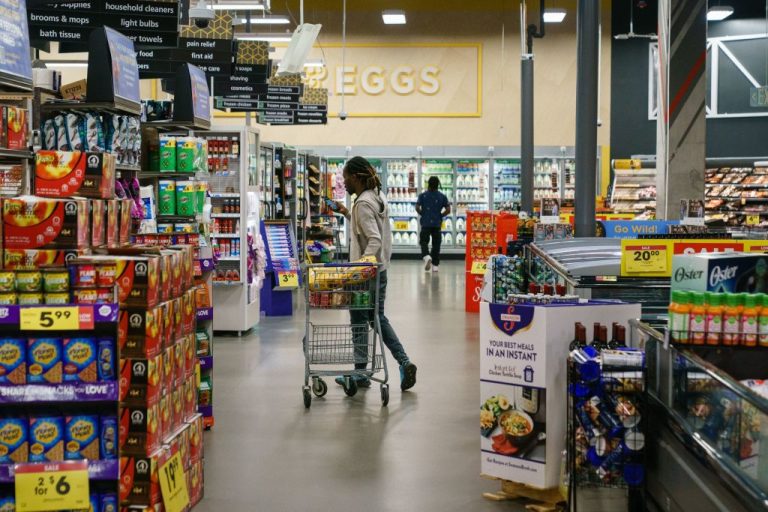U.S. consumer prices rose less than expected in October, pushing the annual increase below 8 percent for the first time in eight months, the strongest signs yet that inflation was slowing, which would allow the Federal Reserve to scale back its hefty interest rate hikes.
But the fight against inflation is far from won, with other data from the Labor Department on Thursday showing a moderate increase in the number of Americans filing new claims for unemployment benefits last week, pointing to a still-tight jobs market. Nevertheless, the rare good news on inflation sparked a rally on Wall Street and sent U.S. Treasury yields tumbling. The dollar slumped against a basket of currencies.
“Inflation is still too high, but there is evidence that the Fed has turned the corner in its fight and that the pace of future interest rate increases will begin to slow,” said Christopher Rupkey, chief economist at FWDBONDS in New York.
“The market is on fire with the long-wished for inflation moderation finally starting to appear.”
The consumer price index rose 0.4 percent last month after climbing by the same margin in September. Economists polled by Reuters had forecast the CPI would advance 0.6 percent. Soaring rents accounted for more than half of the increase in the CPI. Gasoline prices rebounded after three straight monthly decreases.
Success
You are now signed up for our newsletter
Success
Check your email to complete sign up
While food prices increased 0.6 percent, the pace was much slower relative to prior months. The price of food consumed at home rose 0.4 percent, the smallest gain since December 2021. There were increases in the prices of meats, poultry, fish, eggs, cereals and bakery products. But fruits and vegetables cost less.
In the 12 months through October, the CPI increased 7.7 percent after rising 8.2 percent on the same basis in September. It was the first time since February that the annual increase in the CPI was below 8 percent, and the smallest gain since January.
The annual CPI peaked at 9.1 percent in June, which was the biggest advance since November 1981. Annual inflation is slowing as last year’s big increases drop out of the calculation.
Some economists, however, cautioned against declaring that the worst was behind, noting that prices ebbed in July last year through September, before accelerating again.
Inflation in labor-intensive services is also pushing higher as spending shifts from goods.
“Services inflation is a sign of price pressures becoming embedded and these numbers are way too high for the Fed to take much comfort that monetary policy tightening to date has had much impact on underlying inflation,” said Brian Coulton, chief economist at Fitch Ratings.
The Fed last week delivered a fourth consecutive 75-basis-point interest rate hike and said its fight to lower inflation to the U.S. central bank’s 2 percent target would require borrowing costs to rise further. It, however, signaled it may be nearing an inflection point in what has become the fastest rate hiking cycle since the 1980s.
Goods disinflation
Excluding the volatile food and energy components, the CPI increased 0.3 percent last month after gaining 0.6 percent in September. The so-called core CPI is being driven by surging rents as soaring mortgage rates price out prospective buyers.
Owners’ equivalent rent, a measure of the amount homeowners would pay to rent or would earn from renting their property, increased 0.6 percent after shooting up 0.8 percent in September. This measure jumped a record 6.9 percent on a year-on-year basis after rising 6.7 percent in September. But rental inflation has likely peaked.
The CPI rent measures are lagging independent measures, which are all showing moderate rises.
Core services prices rose 0.5 percent. Away from rents and other services, goods disinflation is broadening.
Prices of used cars and trucks plunged 2.4 percent. The cost of apparel declined for the second straight month as retailers offered discounts to move unwanted inventory.
There were also decreases in prices of furniture and bedding as well as appliances. As a result, core goods prices fell 0.4 percent after being unchanged in September, a function of slowing demand and recovering fractured global supply chains.
Airline fares declined 1.1 percent. Healthcare costs fell 0.5 percent as the government incorporated updated data used to estimate health insurance prices.
“The BLS methodology measuring health insurance prices has provided upward price pressure the last twelve months but should now give downward pressure the next year,” said Will Compernolle, a senior economist at FHN Financial in New York.
The core CPI increased 6.3 percent in the 12 months through October after jumping 6.6 percent in September.
A second report from the Labor Department showed the number of Americans filing new claims for unemployment benefits increased moderately last week. Initial claims for state unemployment benefits rose 7,000 to a seasonally adjusted 225,000 for the week ended Nov. 5.
Though job growth is slowing, the labor market remains extremely tight. The government reported last week that nonfarm payrolls increased by 261,000 in October, the smallest gain since December 2020. Employment growth has averaged 407,000 per month this year compared with 562,000 in 2021.
The unemployment rate rose to 3.7 percent from 3.5 percent in September. Still, there were 1.9 job openings for every unemployed person at the end of September.
“The data suggest that the labor market remains in relatively strong shape,” said Daniel Silver, an economist at JPMorgan in New York.
By Reuters (Reporting by Lucia Mutikani; Editing by Paul Simao, Chizu Nomiyama and Andrea Ricci)
















